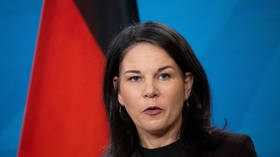US overdose deaths hit RECORD high in 2020, driven by deadly fentanyl
Amid the spread of Covid-19 and economic shutdown, more than 93,000 people died of drug overdoses in the US last year – an increase of 30% since 2019, and a record high. The majority of these deaths were caused by opioids.
Data released by the Centers for Disease Control and Prevention (CDC) on Wednesday makes for grim reading. 93,331 people in the US died from drug overdoses last year, up from 70,980. This increase of nearly 30% is the highest year-on-year increase in at least two decades, and the total number of deaths is the highest ever recorded in a 12-month period.
Opioids were responsible for nearly three-quarters of these deaths, with synthetic opioids responsible for nearly 57,000 deaths, or more than half. Last year, synthetic opioids killed just under 50,000 people.
Also on rt.com Johnson & Johnson settles opioid case in New York, will pay up to $230 million and stop selling deadly drugs in USAmong these synthetic opioids, fentanyl, a drug 50 times more potent than heroin, was “primarily” the cause of death this year, the CDC’s National Center for Health Statistics noted.
Some experts have blamed the Covid-19 pandemic, and the subsequent stress and isolation experienced by many Americans, for the sharp rise in deaths. “This has been an incredibly uncertain and stressful time for many people and we are seeing an increase in drug consumption, difficulty in accessing life-saving treatments for substance-use disorders, and a tragic rise in overdose deaths,” Dr. Nora Volkow, director of the National Institute on Drug Abuse said in a statement.
Yet overdose deaths, particularly those caused by opioids, were rising before the coronavirus reached American shores last year.
Also on rt.com ‘A glorified drug cartel whose dealers wore lab coats, suits and ties’: how Big Pharma made Americans addicted to opioidsFormer president Donald Trump rode into office on a tidal wave of support from the white, working-class areas most affected by the opioid crisis, and declared it a public health emergency back in 2017. Though Trump directed funding to overdose prevention and treatment, and signed a bill cracking down on mail shipments of fentanyl from China, overdoses under his tenure increased unabated, save for a minor decrease in 2018. As fentanyl continues to be smuggled from Mexico across the US’ southern border in record quantities, the Biden administration has proposed tackling the crisis through expanded government healthcare programs.
To that end, Biden this week appointed Dr. Rahul Gupta, a former West Virginia health official, to lead the government’s response to the opioid crisis. In a statement, the White House praised Gupta’s use of “evidence-based strategies to address the overdose epidemic in West Virginia” – one of the states hardest hit by the crisis in recent years.
The over-prescription of opioid painkillers has also been blamed for America’s overdose problem. Johnson & Johnson settled a lawsuit last month charging it with deceptively marketing these painkillers and downplaying the threat of addiction, and several other American drugmakers are still facing charges. Among them are Purdue Pharma – developer and manufacturer of OxyContin – and its owners, the Sackler family.
Thousands of lawsuits targeting Purdue Pharmaceuticals led that firm to declare bankruptcy in 2019, and a year later, it admitted criminal liability in fueling the US’ opioid crisis, and agreed to shell out $8 billion – a largely symbolic gesture from a bankrupt company.
Think your friends would be interested? Share this story!














